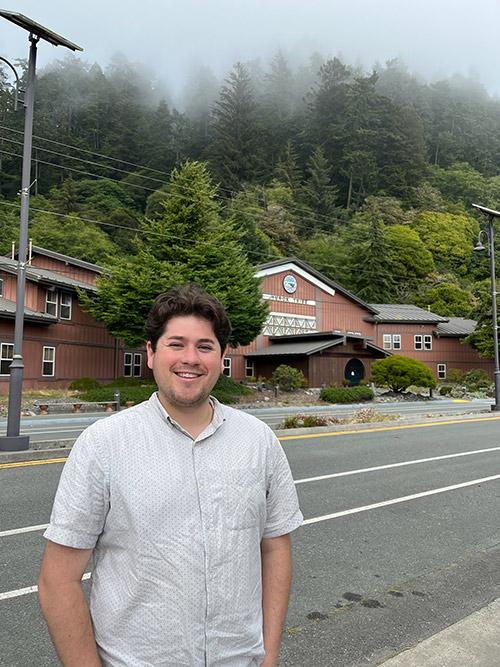Our annual Student Summer Series presents first-person reflections from Berkeley Law students who are involved in an array of compelling summer work experiences. These snapshots of students’ career-enhancing work and skill development — across the legal spectrum — highlight the meaningful opportunities they gain, often in partnership with the school’s Career Development Office.
Braden Hammond ’26 has worked as a logistics specialist, media analyst, and a congressional intern. Before going to college, he spent two years as a senior volunteer leader in Bolivia, where he guided rescue efforts from major floods, created curriculum and class schedules for students, tutored them in core subjects, and helped them apply to college and graduate school. Active in Duke University’s Native American Student Alliance during his time as an undergrad, he is now deeply involved with Berkeley Law’s Native American Law Students Association.
Below, Hammond describes his rewarding summer experience working as a law clerk at the Yurok Tribal Court in Eureka, California.

Before law school, I spent a year working at Duke University’s political center. Within my first few weeks there, after explaining that I was Native to a staff member, I was immediately asked if “my family still hunted with spears.” Emboldened by that experience, I came to law school hoping to find opportunities to honor my heritage and support my people.
During my 1L year at Berkeley Law, I was welcomed by the Native American Law Students Association (NALSA) and had the opportunity to attend Indian Law conferences hosted by the California Indian Law Association and the Federal Bar Association. I took Torts with Professor Seth Davis, who is a staunch advocate for Native people and leads Berkeley Law’s Center for Indigenous Law & Justice.
Inspired by these experiences, I applied to the Philip Frickey Fellowship, which supports 1Ls and 2Ls who accept summer employment involving legal advocacy with Native nations or organizations. I was honored to receive funding to work with California’s largest tribe, the Yurok Tribe, which has been one of the greatest honors of my life.
I had the opportunity to experience the courtroom under Judge Abby Abinanti, the first female Native American admitted to the California Bar and the subject of the documentary “Tribal Justice.” Judge Abby has wholly revamped the criminal justice system and rolled back traditional concepts of justice to make the Yurok community safer, reduce incarceration rates, and provide a better future for Yurok youth.
By addressing the root causes of crime, the Yurok courts provide working models of restorative justice. I split my time in the Yurok tribal offices between writing bench guides for Judge William Bowers, the most compassionate person I have ever met, and clerking for the court.
I had the chance to use my newfound property law “experience” writing forms and guidelines for unlawful detainer cases. I would spend around six hours a day reading the Tribal Code and usually found myself dreaming about it at night.
Learning on the job and adapting were crucial skills, whether in Wellness Court, working with people doing their best to be productive members of the Yurok Tribe, or sitting in meetings with the Humboldt County Corrections Office taking notes on criminal laws I had never heard of before.
I have learned to use [insert one of the legal researching tools that are thankfully free during the summer for interns, but I can’t disclose which one I love more in public] to research anything from criminal procedure relating to people trying to fire a judge who was “mean” to whether there was existing case law for accidentally feeding someone a dog food instead of a similar-looking food (and what if they didn’t notice/there was no harm?).
The Yurok Tribe, as a Native sovereign nation, has its own bar exam, and I have been studying Native Law and the Yurok Tribal Code so I can take the exam at the end of the summer. This would enable me to do pro bono work for people in the tribe and represent the people I have come to greatly respect in court.
After graduating from Berkeley Law, I look forward to following in the footsteps of Native lawyers who are paving the way in their communities and in the legal profession.